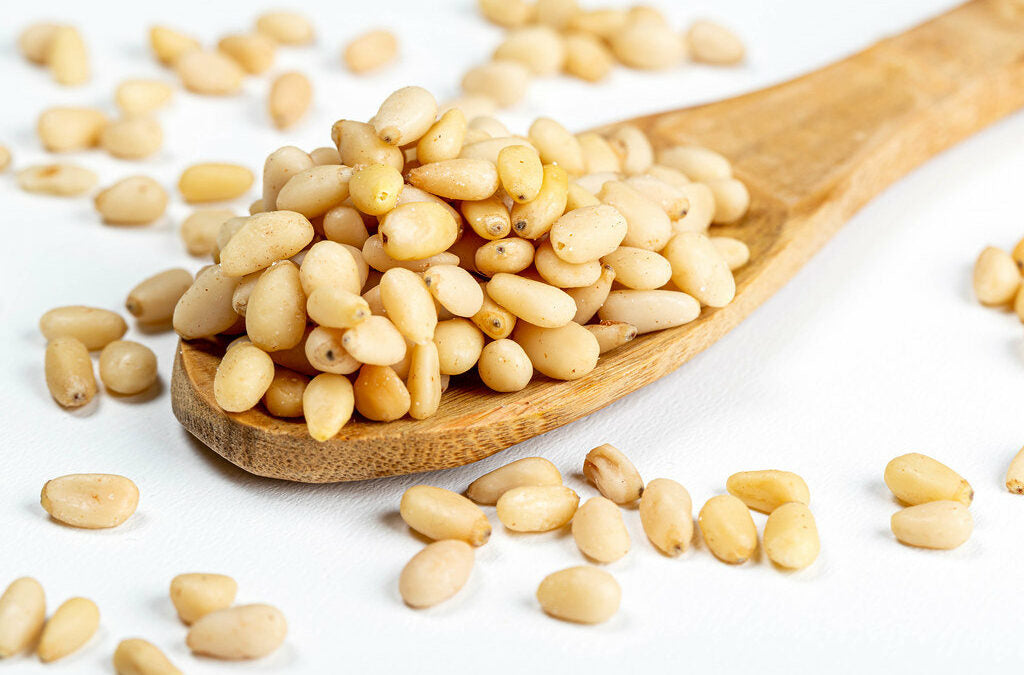A pine nut allergy is when you experience symptoms after eating pine nuts or food containing pine nuts. Symptoms can be unpleasant, ranging from itchy skin to stomach pain. Serious allergies can cause breathing difficulties or anaphylaxis, but thankfully this is rare. In this post, we're going to explore the signs and symptoms of pine nut allergies, how common they are, and what food to avoid if you suspect you suffer from one.
Can you actually be allergic to pine nuts?
Yes, you can be allergic to pine nuts. Like other tree nuts, pine nuts can trigger an allergic reaction in some individuals. These reactions occur because the immune system mistakenly identifies proteins in pine nuts as harmful.
How common is this allergy?
Pine nut allergies are relatively uncommon compared to other tree nut allergies. However, they can still cause significant allergic reactions in those who are sensitive to them.
Pine Nut Intolerance & Allergy | Signs & Symptoms
Signs & Symptoms of a Pine Nut Intolerance or Allergy
What are the symptoms of a pine nut allergy?
Pine nut allergies can manifest in various ways, ranging from mild to severe. Common symptoms include:
| Symptom Type | Examples |
|---|---|
| Skin Reactions | Hives, itching, eczema, redness |
| Gastrointestinal | Nausea, vomiting, diarrhea, stomach cramps |
| Respiratory | Sneezing, runny nose, wheezing, coughing |
| Severe Reactions | Anaphylaxis (difficulty breathing, swelling) |
What are the symptoms of a pine nut intolerance?
Pine nut intolerance is different from an allergy and usually involves the digestive system. Symptoms can include:
| Symptom Type | Examples |
|---|---|
| Gastrointestinal | Bloating, gas, stomach pain, diarrhea |
| General | Headaches, fatigue |
What is food intolerance?
Food intolerance occurs when your body has difficulty digesting certain foods. Unlike food allergies, which involve the immune system, food intolerances are generally less severe and primarily affect the digestive system.
How common is a pine nut intolerance?
Pine nut intolerance is not well-documented and is considered rare. Most reactions to pine nuts are due to allergies rather than intolerances.
How do you test for a pine nut allergy or intolerance?
Testing for a pine nut allergy typically involves:
What should you do if you think you have a pine nut allergy or intolerance?
If you suspect you have a pine nut allergy or intolerance, it's essential to see a healthcare provider. They might recommend:
- Skin prick test: Small amounts of pine nut proteins are pricked into your skin to see if there's a reaction.
- Blood test: Measures the amount of specific antibodies produced in response to pine nuts.
- Elimination diet: Involves removing pine nuts from your diet to see if symptoms improve.
What foods should you avoid if you have a pine nut allergy or intolerance?
If you have a pine nut allergy or intolerance, avoid foods that contain pine nuts or are processed in facilities that handle tree nuts. Common foods to avoid include:
- Pesto
- Salads with pine nuts
- Baked goods containing pine nuts
- Trail mixes and granola bars
- Some sauces and dressings
10 alternatives to pine nuts
Here are ten alternatives you can use if you need to avoid pine nuts:
- Sunflower seeds
- Pumpkin seeds
- Almonds (if not allergic to other tree nuts)
- Cashews (if not allergic to other tree nuts)
- Walnuts (if not allergic to other tree nuts)
- Hemp seeds
- Chia seeds
- Flax seeds
- Sesame seeds
- Peanuts (if not allergic)
How to test if you have a pine nut allergy or intolerance
If you believe you may have a pine nut allergy or intolerance, consider taking a comprehensive food sensitivity test. Check My Body Health offers detailed health tests that can help you identify sensitivities and guide your dietary choices.
FAQ
1. Can pine nut allergies develop later in life? Yes, like many other food allergies, pine nut allergies can develop at any age, even if you previously consumed pine nuts without any issues.
2. Are pine nut allergies related to other nut allergies? Pine nuts are tree nuts, so if you have an allergy to other tree nuts, you might be more likely to be allergic to pine nuts as well.
3. Can pine nut allergies be outgrown? While some children outgrow tree nut allergies, it is less common for adults to outgrow them. Consult with an allergist for specific advice.
4. Are pine nut allergies dangerous? In severe cases, pine nut allergies can lead to anaphylaxis, a life-threatening reaction. It's crucial to avoid pine nuts if you have a known allergy and to carry an epinephrine auto-injector if prescribed by your doctor.
5. Can you have a mild pine nut allergy? Yes, some individuals may experience only mild symptoms, such as itching or minor digestive issues, when consuming pine nuts.



